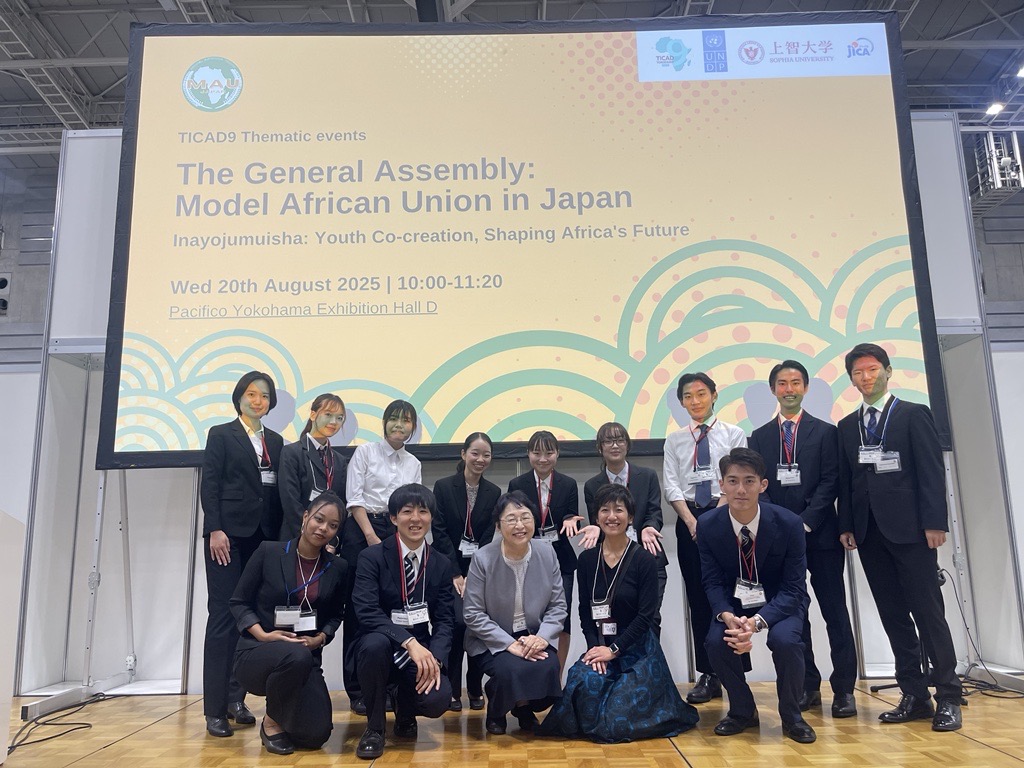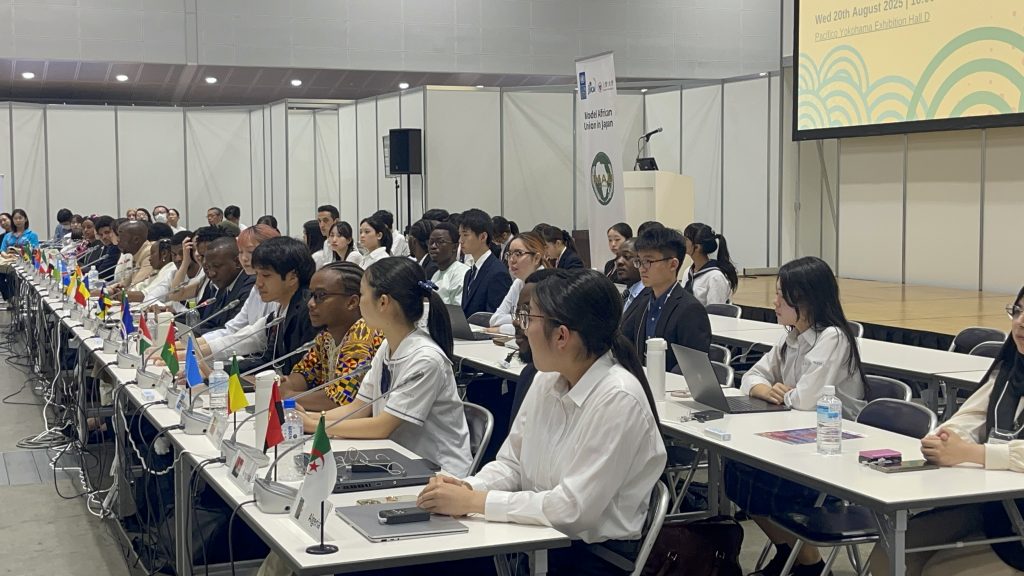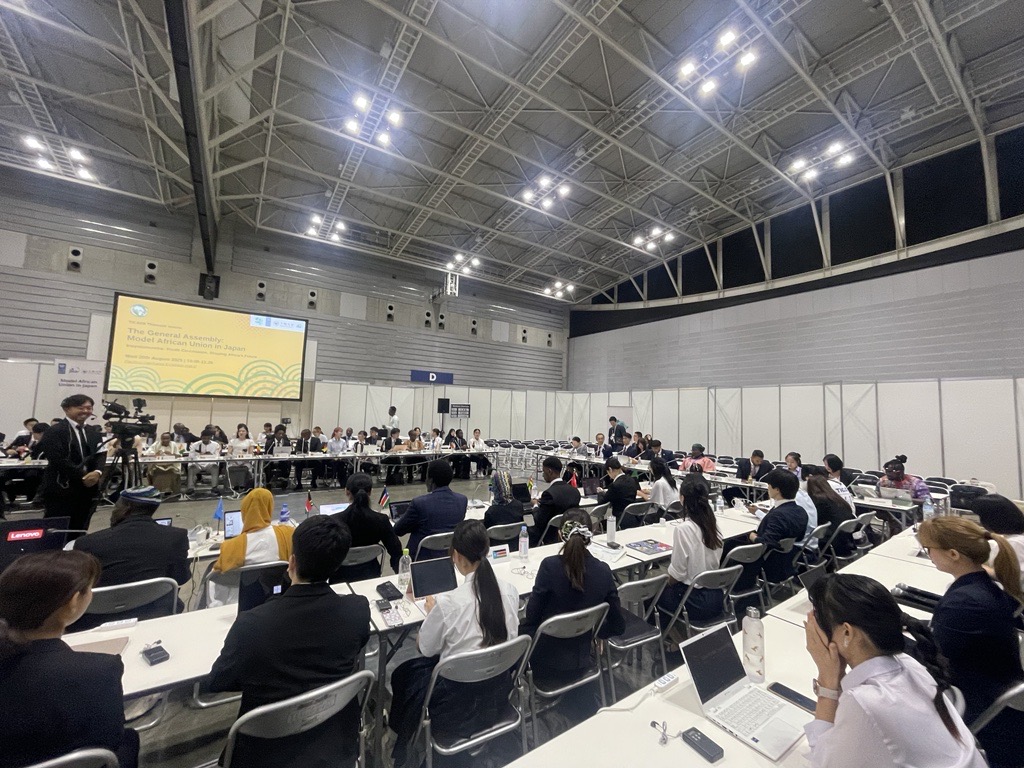The 2nd edition of Model African Union in Japan held as a thematic event of TICAD 9

The 9th Tokyo International Conference on African Development (TICAD 9), held in Yokohama from August 20 to 22, 2025, brought together Japan, African countries, international organizations, and civil society in an important international forum to strengthen cooperation toward Africa’s sustainable development.
As part of its thematic events, the 2nd edition of Model African Union in Japan (MAU Japan) was co-hosted by Sophia University, the United Nations Development Programme (UNDP), and the Japan International Cooperation Agency (JICA). It operates under the advisory support of the African Union Commission (AUC). The General Assembly of MAU gathered African and Japanese students, who engaged in policy discussions while assuming the roles of representatives from African Union (AU) member states.
The purpose of the Model AU is to provide young people with opportunities to actively reflect on and communicate Africa’s challenges and potential, based on the AU’s long-term vision “Agenda 2063” and the principles of the “African Youth Charter.” In Japan, the first edition of Model AU was held in August last year.
This year, two Sophia University students joined the Model AU Executive Committee, which served as the core of the organizing body, while ten students supported the meeting’s operations as rapporteurs. The rapporteurs contributed to drafting resolutions, taking minutes, and supporting to facilitate discussions between international and Japanese students.

The 2nd edition of Model AU was held under the theme “Inayojumuisha: Youth Co-Creation, Shaping Africa’s Future.” At the opening ceremony, Mme. Elsie Attafuah, UNDP Resident Representative in Nigeria, emphasized that African and Japanese youth are partners in building the future together. She highlighted that the realization of an inclusive society that leaves no one behind lies at the heart of the Model AU.
Mr. Naoki Ando, Senior Vice President of JICA, also addressed the participants, expressing high expectations for the power and potential of youth. He stressed that the Model AU is not merely a simulation of diplomacy but a “celebration of the power of co-creation,” recognizing young people as “change-makers” who are already driving transformation. He underlined that the spirit of co-creation through dialogue and mutual understanding is the key to building a sustainable and inclusive society.

Participants prepared extensively by compiling policy documents for their assigned countries and visiting embassies in advance. During the meeting, they engaged in lively debates on a wide range of issues—including education, employment, innovation, entrepreneurship, gender equality, and political participation—leading to the empowerment of youth and the strengthening of Japan–Africa cooperation.
Throughout the discussions, many delegations framed their arguments in line with “Agenda 2063,” positioning youth not only as future leaders but also as agents of change in the present. A shared recognition emerged that the leadership of young people in fields such as the economy, education, and politics is essential for Africa’s autonomous and sustainable development.
At the conclusion of the meeting, the award for Outstanding Delegation was presented to the teams representing South Africa, Botswana, Kenia and Guinea.
At the closing ceremony, Professor Miki Sugimura, President of Sophia University, delivered remarks, highlighting the significance of the university serving as an “intellectual platform” for international dialogue. She expressed the university’s commitment to further strengthening Japan–Africa collaboration through academic cooperation and other initiatives. Reflecting on the depth of dialogue among youth at the Model AU, she noted that the meeting provided a valuable opportunity to approach global issues from multiple perspectives, thereby bringing the 2nd Model AU to a close.
As the closing remarks, H.E. Ambassador Bankole Adeoye, Commissioner for Political Affairs, Peace and Security at the African Union Commission emphasized that youth inclusion is essencial for shaping the African Union’s strategic initiatives. He also hilightened the importance of eace education and he encouraged youth to lead to foster sustainable development.